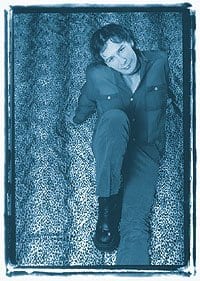Poet and busy bee Trish Salah has a lot to celebrate this Christmas – even if the idea of “celebrating Christmas” gives her, like many queers, a bad case of the high holy heebie-jeebies.
“Yes, Christmas is a freaky and scary time, but this year my first poetry book, Wanting In Arabic, came out, and my dissertation’s close to done, and I’m working [with Mirha-Soleil Ross and Jean Bobby Noble] on a Counting Past Two anthology based on the performance festivals, and, oh my, the electroclash ’80s music revival means I can wear my Cure-inspired puffy pirate shirt in public again!”
Born in Halifax 34 years ago, the poet, performance artist and PhD candidate knows all about nativity scenes, midnight mass and virgin births. “I was brought up Catholic,” says Salah, laughing, “Maronite Catholic, the Lebanese brand, which is very formal, very strict, very pre-Vatican II – a perfect fit for Halifax in the 1970s. I still go once in a while to the Maronite church in Parkdale, just to hear Arabic spoken, but I’m not exactly practicing.”
That’s an understatement. One wonders what the patriarchs of the Maronite (or any other) church might have to say about the gorgeous and provocative Wanting In Arabic. Taking on everything from Salah’s family history and transgender life to societal transphobia and the sexist (or at least sexualized) roots of language, Wanting In Arabic is the kind of book that makes the Durham Catholic School Board nervous. After all, they don’t call God “our father” for nothing. (See reviews of new queer poetry beginning on this page.)
But Salah points out that opposition to new trans writing doesn’t come just from the usual suspects. Many in the supposedly liberal arts and publishing world are equally hung up about how Ms Salah is hung.
“I’m very excited about getting my book out there, finally, because I’ve been working on some of these poems for a long time. But I was worried about the subject matter finding a publisher – the trans stuff in particular. I know there’s a lot about trans people out there, but not in the mainstream literary world, and certainly not simply as literature. There’s lots of news articles, lots of documents, but not much expression by trans people. I’m finally making the jump from being anthologized and anthropologized as part of a niche to having my own book.”
And she couldn’t be happier.
“I have a bunch of readers from a bunch of different communities. I live and work and read my poetry in many places and so I’m available, my work is open, to many. And I’m always trying to call a readership into conversation, make a space for readers to engage me and my work – and that space isn’t made from nothing. I have to weave elements together, in the hope that I’m creating possibilities for dialogue.”
Dialogue is key to understanding Salah’s poetry. Her poems unfold on the page like play scripts fed through a blender, and her exuberant, playful knots of language encourage multiple responses. If you want tidy, simple poems about grandma’s corns or waving fields of daisies, go buy a Reader’s Digest.
When I tell Salah how much I love the density and puzzle-like quality of her poetry, she is quick to remind me that she is not another elitist, brainiac poet.
“My background is in literary theory [as part of her PhD studies], but all that means is that it makes me see language as a series of questions and makes language richer to me, makes it something to move through. And then, of course, those questions lead to real-life questions, such as: How does one live in the world, make a community, find love and speak yourself in a context where you feel you can speak? These are questions all of us ask.
“Add into that the fact that my work stems from both Western and Urdu poetic traditions and feminist traditions and queer traditions, and I figure that that’s a pretty big audience.”
From Catholicism to literary theory to Urdu poetics in 10 minutes – that’s Trish Salah, in person and on the page. The only thing left to ask is: What do you want for Xmas?
“A gift certificate for more surgery. Really good surgery.”


 Why you can trust Xtra
Why you can trust Xtra


